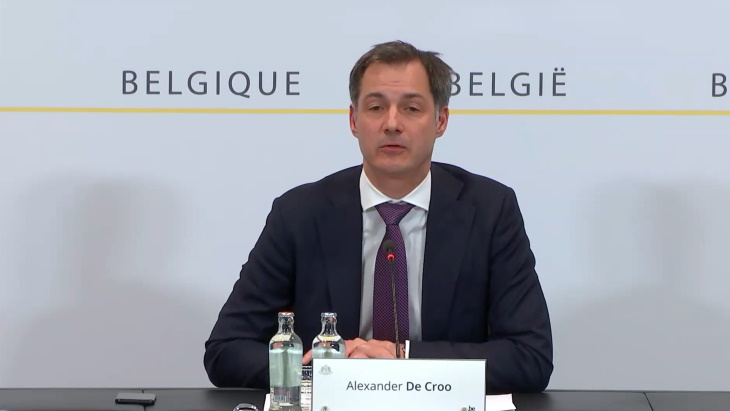Extended operation of two Belgian reactors approved
Belgium's federal government has decided to allow Doel 4 and Tihange 3 to continue operating until 2035 in order to allow the country to "strengthen its independence of fossil fuels in turbulent geopolitical times". The coalition government had earlier agreed to phase out the use of nuclear energy by 2025.

Belgian Prime Minister Alexander De Croo announcing the extended operation of Doel 4 and Tihange 3 (Image: www.premier.be)
Under a plan announced by Belgium's coalition government in December last year, Doel 3 and Tihange 2 will be shut down in 2022 and 2023, respectively. The newer Doel 4 and Tihange 3 would be shut down by 2025. However, it requested the Federal Agency for Nuclear Control (FANC) consider the extended operation of the two newer reactors if a report by grid operator Elia, due on 18 March, showed the security of energy supply would be jeopardised after 2025 without nuclear energy.
Belgium's nuclear plants account for almost half of the country's electricity production. It has still not been established how the country will make up the shortfall from closing its reactors. Elia has previously said that at least 3.6 GWe of new thermal capacity would be needed by the end of 2025.
FANC submitted its analysis of a possible extension of the operating period of Doel 4 and Tihange 3 to the federal government in January. The report analysed and listed the decisions to be taken and the actions to be implemented in the short and medium-term to be able to operate the reactors longer than expected, in the event that this extension proves necessary to guarantee energy supply beyond 2025.
The continued operation of the units is referred to as "Plan B". FANC said the long-term operation of the reactors is possible from the nuclear safety point of view, albeit with necessary regulatory modifications and improvements to the safety of the installations.
"For Plan B to be activated, it is crucial that the government makes a clear decision before the end of the first quarter of 2022," FANC said. "It will then be up to the operator of the nuclear power plants to carry out their analysis and determine whether they are willing to make the necessary investments."
On 18 March, the government announced its decision to allow Doel 4 and Tihange 3 to operate until 2035, allowing for the retention of 2 GWe of nuclear generation capacity.
"The minister of energy and the prime minister are asked to continue discussions with the European Commission on the impact of the extension on the Capacity Remuneration Mechanism," it said in a statement. "Discussions with operator Engie will also continue."
Engie said it would work with the government to study the feasibility of the extended operation of the two units, according to Reuters. The utility said the decision to extend their operation raises "significant safety, regulatory and implementation constraints." It added: "Because this is unforeseeable and given its scale, this presents a risk profile that goes beyond a private operator's normal activity."
The preliminary draft law for the extension of the Doel 4 and Tihange 3 must be submitted by the end of March for approval to the Council of Ministers, as must the draft Royal Decree amending the Royal Decree of 30 November 2011 concerning safety regulations for nuclear installations, the government noted.
"The extension of the two nuclear power plants should not push the production of renewable electricity out of the market," the government said. "That is why it will be examined, among other things, whether the nuclear power stations can also be used in the event of overproduction to kick-start the hydrogen market in Belgium."
The federal government also announced investments totaling EUR1.1 billion (USD1.2 billion) "to give a boost to the transition to climate neutrality". It said the aim of the investments in offshore wind, hydrogen, solar energy and sustainable mobility was to accelerate independence from fossil fuels.
Included in those investments is EUR25 million over the next four years for small modular reactors. "Belgium has leading expertise in the field of new nuclear technologies and will invest in this field in the coming years" in collaboration with the country's Nuclear Research Centre (SCK-CEN) and the Myrrha accelerator-driven research reactor, the government said.
Researched and written by World Nuclear News
- China Institute of Atomic Energy
- Nuclear Power Institute of China
- Southwestern Institute of Physics
- China Nuclear Power Operation Technology Corporation, Ltd.
- China Nuclear Power Engineering Co., Ltd.
- China Institute for Radiation Protection
- Beijing Research Institute of Uranium Geology (BRIUG)
- China Institute of Nuclear Industry Strategy (CINIS)
- China Nuclear Mining Science and Technology Corporation


